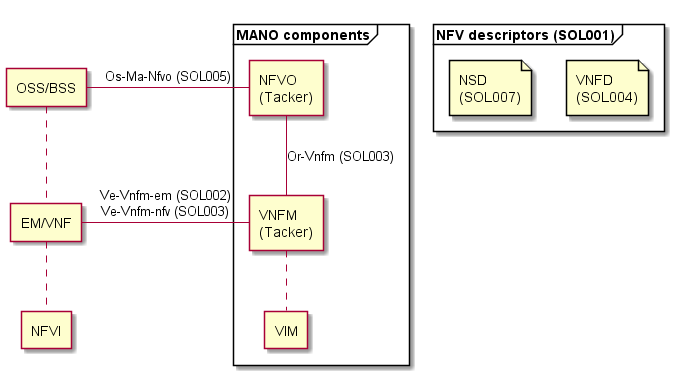Introduction¶
Tacker is a Generic VNF Manager (VNFM) and an NFV Orchestrator (NFVO) to operate Network Services (NSs) and Virtual Network Functions (VNFs) on an NFV infrastructure platform like OpenStack or Kubernetes. The operations are based on ETSI NFV Management and Orchestration (MANO) Architecture 1.
Now Tacker has two different architectures:
ETSI NFV-SOL based implementation
Legacy implementation
When Tacker project was originated to follow the ETSI NFV MANO standards in Liberty release, the standarding for “NFV Solutions (SOL)”, which is the specifications for protocols and data models, was not yet defined. After the publications of SOL documents for NFV descriptors such as VNF descriptor (VNFD) and NS Descriptor (NSD) as NFV-SOL001, NFV-SOL004, and NFV-SOL007, and also after REST-based APIs have been specified as NFV-SOL002, NFV-SOL003, and NFV-SOL005, the SOL based new implementations have started in Ussuri release.
ETSI NFV MANO concept¶
MANO functional blocks are:

NFV Orchestrator(NFVO) - is responsible for on-boarding NS and VNF, and providing global resource management, validation and authorization of NFV infrastructure (NFVI) resource requests. VNF Manager(VNFM) - is responsible for the lifecycle management of VNF. Virtualised Infrastructure Manager (VIM) - controls and manages compute, storage, and network resources.
Tacker provides a functional block of NFVO and VNFM. VIM can be an OpenStack or Kubernetes cluster. In a particular use case to deploy a VNF instance, you need to prepare a VNF Package. A VNF Package includes VNFD, software images for Virtual Machine (VM), and other artifact resources such as scripts and config files. NFVO is called to deploy a VNF instance with a VNF Package, then NFVO asks VNFM to deploy actual VNF on a NFV infrastructure. All the interfaces involved in this process is defined in ETSI NFV specifications.
